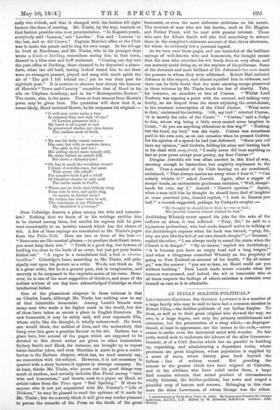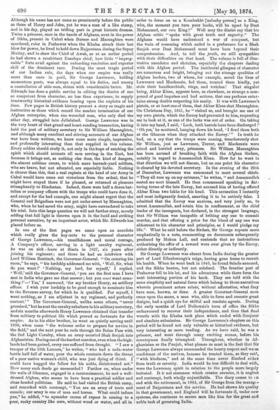AN INDIAN SOLDIER-POLITICAL.•
LIEUTENANT-GENERAL SIR GEORGE LAWRENCE is a member of a large family who may be said to have bad a common ancestor ins Robert Clive,—the Soldier-politicals of our Indian Empire. To them, as well as to their great original who showed the way, we owe, in a large degree, not only the primary establishment and extension, but the preservation of a sway which,—so dispropor- tioned, at least in appearance, are the means to the ends,—never ceases to strike even the instructed mind with wonder. No fair critic would seek to underrate the labours of the abler Governors- General, or of a Civil Service which has no parallel in building up, organising, and administering a dependent realm, whose provinces are great kingdoms, whose population is supplied by a score of races, whose history goes back beyond the fathom - line of written record. But granting the utmost to the greater chiefs who have reigned at Calcutta, and to the civilians who have ruled under them, a large field remains wherein that mixed product of circumstances wholly Oriental, the Soldier-political, has sown and reaped a plentiful crop of honour and renown. Belonging to this class were the three Lawrence*, of whom George was the eldest.
*,...Bantniscences of Forey-three Year, in India. By Lieutenant-General Sir George Lawrence, C.B. Edited by W. Edwards, London: John Murray. Although his name has not come so prominently before the public as those of Henry and John, yet he was a man of a like stamp, .aud in his day, played no trifling part in great. historic dramas. Twice a prisoner, once in the hands of Afghans, next in the power of Sikhs, present in Cabul when Burnes and Macnaghten were murdered, ruler in Peshawur when the Khalsa struck their last blow for power, he lived to hold down Rajpootana during the Sepoy Mutiny, and to show the Chief of Awah, as at an earlier period .he had shown a recalcitant Eusufzye chief, how little " impreg- nable" forts avail against the unbending resolution and superior skill of the dominant race. During the most tragic period of our Indian rule, the days when our empire was really more than once in peril, Sir George Lawrence, holding momentous posts, was always equal to his duties, and among a constellation of able men, shines with considerable lustre. Mr. Edwards has done a public service in editing the diaries of one so competent from character, no less than experience, to supply trustworthy historical evidence bearing upon the exploits of his time. Few pages in British history present a story so tragic and instructive as those which record the sombre termination of our Afghan enterprise, when one wounded man, who only died the other day, struggled into Jellalabad. George Lawrence was in the very heart of that grand and heart-rending transaction, having held the post of military secretary to Sir William Macnaghten, and although many excellent and stirring accounts of our Afghan war have been written, we know none more simple, impressive, and profoundly interesting than that supplied in this volume. Every soldier should study it, not only in the hope of catching the spirit which should animate all men serving in the East, but because it brings out, as nothing else does, the kind of dangers, the almost sublime errors, to which mere barrack-yard soldiers, who are brave, but not educated, are especially liable. Nothing is clearer than this, that a real captain at the head of our Army in Cabul would have come out victorious from the ordeal, that he might have stayed there if he pleased, or returned at pleasure triumphantly to Hindostan. Indeed, there were half a dozen bat- talion or company officers with the troops who could have done it, .and except for the bad example, one might almost regret that the General and Brigadiers were not put under arrest by Macnaghten, who, when he had saved the army, might have surrendered to take his trial. Into this large question we will not further stray, merely -adding that full light is thrown upon it in the lucid and striking personal narrative, by an important actor, which Mr. Edwards has placed before us.
In one of the first pages we come upon an anecdote which really gives the key-note to the personal character of George Lawrence,—his unselfishness and moral courage, A Company's officer, serving in a light cavalry regiment, he was on sick - leave at Simla in 1827, six years after joining his regiment ; and there he had an intetview with Lord William Bentinck, the Governor-General. " On entering his room," he says, " his lordship addressed me with, Well, Sir, what do you want?' Nothing, my lord, for myself,' I replied. ' Well,' said the Governor-General, you are the first man I have met in India who gave me that answer ; but you must want some- thing ?'—' Yes,' I answered, 'for my brother Henry, an artillery officer. I wish your lordship to be good enough to nominate him to the Revenue survey, for which be is qualified. For myself, I want nothing, as I am adjutant in my regiment, and perfectly content.'" The Governor-General, unlike some others, " never promised," but he sent the cavalry subaltern to his military secretary, and six months afterwards Henry Lawrence obtained that transfer from military to political life which proved so fortunate for the empire. As to his elder brother, he went on quietly serving until 1838, when came " the welcome order to prepare for service in the field," and the next year be rode through the Bolan Pass with the 2nd Light Cavalry, when an army escorted Shah Soojah into Afghanistan. During one of the hardest marches, even when the high- lands had been gained, every one suffered from drought. " I saw a trooper of the 16th Lancers," he writes, " who had a soda-water bottle half full of water, pour the whole contents down the throat. of a poor native woman's child, who was just dying of thirst. I could have hugged the fellow for his noble, disinterested act." How many such deeds go unrecorded ? Further on, when under the walls of Ghuznee, engaged in a reconnaissance, be met a well- dressed Afghan, who seems to have been a practical soldier and clear-headed politician. He said he had visited the British camp, and remarked with contempt, " Yon are an army of tents and camels; our army is one of men and horses. What could induce you," he added, " to squander crores of rupees in coming to a poor, rocky country like ours, without wood or water, and all in
order to force on us a Kumbukht [unlucky person] as a King, who, the moment you turn your backs, will be upset by Dost Mohammed, our own King?" Well may the diarist say that his Afghan critic " spoke with great truth and sagacity." The Afghans would have understood a war of conquest, but the train of reasoning which ended in a preference for a Shah Soojah over Dost Mohammed must have been keyond their comprehension. And, to tell the _truth, we still sympathise with their difficulties on that head. The volume is full of illus- trative anecdotes and sketches, especially the chapters dealing with this Afghan period. The incidental glimpses of character are numerous and bright, bringing out the strange qualities of Afghan leaders, two of whom, for example, saved the lives of Lawrence and Mackenzie, fed them, treated them kindly, yet stole their handkerchiefs, rings, and watches! That singular being, Akbar Khan, appears here, as elsewhere, so strange a com- pound of good impulses and bad actions, that one perforce enter- tains strong doubts respecting his sanity. It was with Lawrence's pistols, or at least one of them, that Akbar Khan shot Macnaghten. On Christmas Day, 1811, he "visited us, and brought me one of my own pistols, which the Envoy had presented to him, requesting me to look at it, as one of the locks was out of order. On taking it into my hand, I said, ' Look, both barrels have been discharged !'
Oh yes,' he muttered, banging down his head, I fired them both at the Gbazees when they attacked the Envoy.' " In truth he had, on a cry that the troops were coming, treacherously shot Sir William, just as Lawrence, Trevor, and Mackenzie were seized and hurried away, prisoners. Sir William Macnaghten has been accused of breaking faith with the Afghan Sirdars, notably in regard to Ameenoollah Khan. How far he went in that direction we will not discuss, but on one point his character is cleared by his devoted secretary. In the evening of the 26th of December, Lawrence was summoned to meet several chiefs. " They all rose up on my entrance," he writes, " and Ameenoollah seated me next himself. He then commenced speaking in flat- tering terms of the late Envoy, but accused him of having offered Akbar Khan two lakhs for his head. This accusation I instantly and most indignantly denied, asserting it to be entirely false. I admitted that the Envoy was anxious, and very justly so, to arrest Ameenoollab, and retain him in confinement, as the chief leader of the insurgents, but declared, in the strongest language, that Sir William was incapable of bribing any one to commit murder, and that offering a price for the blood of any one was abhorrent to his character and principles, as I would pledge my life." What he said before the Sirdars, Sir George repeats more emphatically in a note, commenting on documents subsequently produced by Mohun Lall, and contends that no instructions authorising the offer of a reward were ever given by the Envoy, either directly or indirectly.
Sir George Lawrence was absent from India during the greater part of Lord Ellenborough's reign, having gone home to recruit his health. When he went back in 1846, he found Scinde annexed, and the Sikhs beaten, but not subdued. The frontier post of Peshawur fell to his lot, and his adventures while there form the next interesting portion of his book. They are told with the same simplicity and natural force which belong to those narratives wherein prominent actors relate, without affectation, what they have seen, known, or done. A greater Governor-General soon came upon the scene, a man who, able to form and execute great designs, bad a quick eye for skilful and resolute agents. Daring the early months of Lord Dalhousie's term of office the Sikhs endeavoured to recover their independence, and then that final wrestle with the Khalsa took place which ended with Goojerat and absolute submission. Sir George Lawrence's chapters on this period will be found not only valuable as historical evidence, but very interesting as mere reading. As we have said, he was a prisoner, and went through many exciting scenes, before his countrymen finally triumphed. Throughout, whether in Af- ghanistan or the Punjab, what pleases us most is the fact that Sir George Lawrence always commanded the hearty respect and warm confidence of the natives, because he treated them, as they said, "with kindness," and at the same time never flinched either from truth or severity. India would be less difficult to deal with, were the Lawrence spirit in relation to the people more largely imitated. It it not sternness which creates enemies, it is neglect and contempt, both wholly unjustifiable. The diary comes to to end with the retirement, in 1864, of Sir George from the manage- ment of Rajpootana and the service. He had shown his quality in that government, and England will be fortunate if, under new systems, she continues to secure men like him for the great and noble task of governing India.



































 Previous page
Previous page